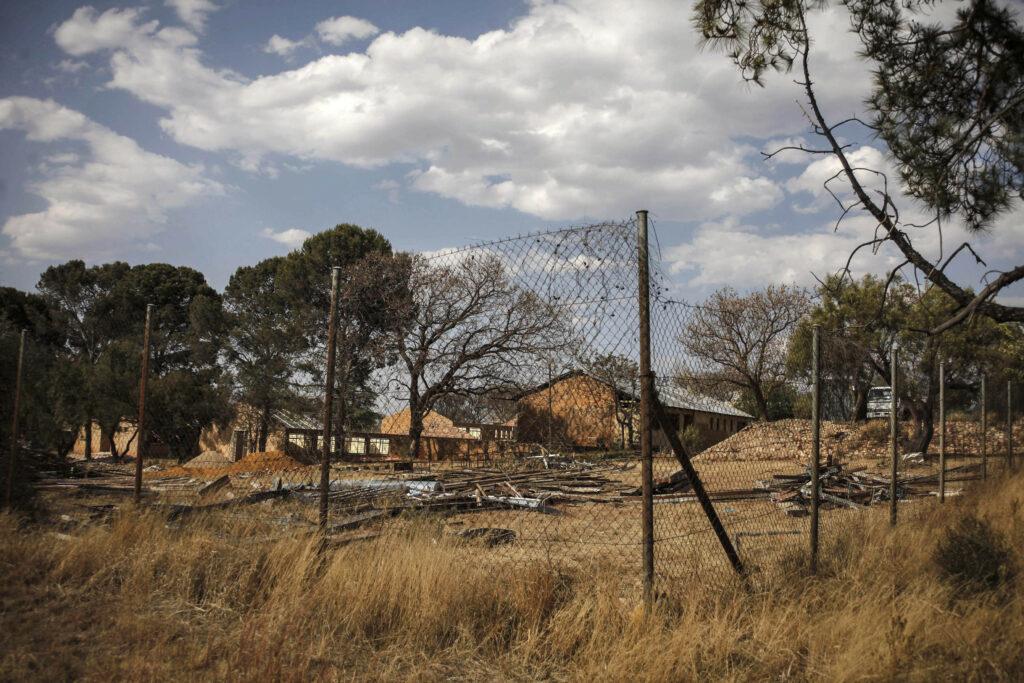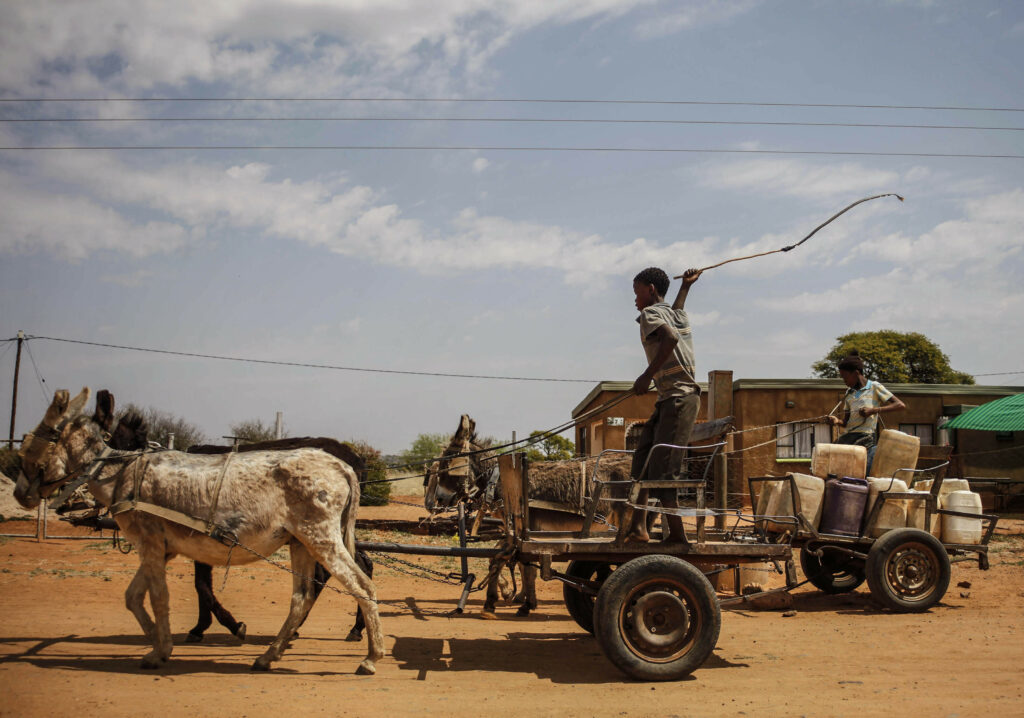Grade 11 learner ( who wish to remain anonymous) from Onkgopotse Tiro Combine School has resorted in assisting in building his mother’s new home to keep busy and to learn in order to prepare himself for a civil engeneering course that he wants to persue when he finished school. Without any explanation from his school, he has been sitting at home since the beggining of the lockdown even though other learners from different schools have started attending. (Oupa Nkosi)
Two hundred children have missed six months of lessons this year because their farm school in North West does not have a Covid-19 compliant hostel.
Many of those at Onkgopotse Tiro Comprehensive School will have to repeat their grade and others are considering signing up with labour brokers to work on farms in the Western and Northern Cape.
Nationally the school dropout rate in grade 11 averages 24%, according to a parliamentary response by Minister of Basic Education Angie Motshekga. Research shows this happens towards the end of the year when learners write exams.
“The department is therefore prioritising interventions both to keep learners in school and to improve the quality of learning outcomes throughout the school system so that learners reach grades 10, 11 and 12 better equipped for the national senior certificate examination.”
Onkgopotse Tiro school is about 24km from Mahikeng, near the village of Slurry. Many of the learners are children of migrant farm labourers.
“People who work in farms move around a lot, chasing where there is employment. The boarding school had created a lot of stability for the children,” said the aunt of four learners registered at Onkgopotse Tiro.
The school has been falling apart for years. In 2017 its hostels were closed after learners protested over what they said were unhygienic conditions, including toilets that did not work, and the ceiling falling apart. Renovations to the buildings have been going on for four years. Since then learners were moved to neighbouring schools with hostels and bused to Onkgopotse Tiro.
 Onkgopotse Tiro Comprehensive School on a Flurry farm that is between Zeerust and Mahikeng, North West province has not been operarational since the beginning of the lockdown. (Oupa Nkosi)
Onkgopotse Tiro Comprehensive School on a Flurry farm that is between Zeerust and Mahikeng, North West province has not been operarational since the beginning of the lockdown. (Oupa Nkosi)
When the pandemic forced schools to close and reopen under the various lockdown regulations, only grade 12 and some grade seven learners have been able to return to Onkgopotse Tiro.
A week after the Mail & Guardian sent questions to the provincial department of education its spokesperson, Elias Malindi, said that all grades had been back at school except for individual cases and that the department was “intervening”. He said the department has held meetings with parents in different towns about why their children were not back at school and that “there are pictures to proof”.
But a day before the M&G received the department’s response last week, 30 learners told the newspaper that no hostel learners had been back at school in six months. Even this week, the learners had not returned to school. They said neither the school nor the provincial department had been in communication with them about their fate.
Malindi said some learners at Onkgopotse Tiro were being placed at schools near where they come from and that the department was about to conclude that process.
Mathapelo*, a parent with three children at the school, said she had not heard anything about when children who live in the hostels can return. Other parents in the villages near the school confirmed this.
Mathapelo has two children in grade 11 and one in grade 10.
“Ga go monate (It is not nice) to see my children not at school. Children must go to school so that one day they can work and take care of us,” she said.
Mathapelo, who works as a cleaner at a guest house in Rustenburg, cannot afford to take her children to another school. Onkgopotse Tiro is a no-fee school, which helps her to provide for the 10 people in her household who depend on her income.
As millions of other learners in South Africa are back behind their desks, Mathapelo’s son is helping his mother build the family home.
Her daughters, Bohlali* and Tshepiso*, said they desperately wanted to return to school and it hurt them to see other children attending classes while they remain at home.
Tshepiso said one of the things that motivates her not to give up on going back to school is helping her younger siblings, who attend a primary school in the village, with their school work.
“I look forward to them coming back from school and helping them with their homework. It excites me to help them, but sometimes I feel sad because I wish that I could be working on my schoolwork.”
As learners from Onkgopotse Tiro inch closer every day to losing a year of schooling, government departments continue to make promises.
Mathanzima Mweli, the director general of the basic education department, told the parliamentary portfolio committee last month that 61 hostels in North West had been audited. Out of that number 39 would be able to comply with social distancing regulations.
Mweli’s presentation indicated that the North West education department had provided mobile hostels at some schools. He said that learners who could not be accommodated at these hostels would be would be transported to other schools.
 Tshepang Seetle (15) and his friend Lehlohonolo Moetla (15) going to buy water that cost R2 per 20L from one of the neighbours that owns a borehole in his yard in the Setlagole village, Mahikeng, North West province. (Oupa Nkosi)
Tshepang Seetle (15) and his friend Lehlohonolo Moetla (15) going to buy water that cost R2 per 20L from one of the neighbours that owns a borehole in his yard in the Setlagole village, Mahikeng, North West province. (Oupa Nkosi)
But Onkgopotse Tiro school seems to have been forgotten.
A Government Gazette published two weeks ago by Motshekga said that, if a hostel does not comply with all the guidelines and regulations to minimise the spread Covid-19, then children cannot use the facility.
The directive stipulates that in such an event the principal or chairperson of the school governing body or any delegated official must inform parents, caregivers or family members that their children cannot remain at the hostels.
The M&G sent questions to the department of basic education about the situation at Onkgopotse Tiro but is yet to receive a response.
Tarryn Cooper-Bell, an attorney at the Equal Education Law Centre, said Onkgopotse Tiro school and the provincial department must ensure that the education of the learners continues by providing additional hostel infrastructure or learning material at home.
“The right to basic education, and by extension the right to [suitable] infrastructure, which is inextricably linked to the right to and provision of education, is an immediately realisable right and not subject to the available resources of the education department.
“Any failure to do so by either the school or the provincial education department would constitute a severe limitation to these learners’ constitutional right to education,” said Cooper-Bell.
Unfortunately the majority of learners at the farm school have no one to hold the department accountable.
Ditiro* is 21 and in grade 10. It is his age that makes him panic that he is not at school.
“I am not even sure that I would be allowed to go back because of my age,” he says “I am scared, but all I want is to finish my studies.”
Ditiro says other learners who are “overage” have been kicked out of school in the past. According to the law, it is compulsory for seven to 15-year-olds to attend school, but there is no legislation saying that people must leave school when they reach a certain age.
Tseleng Lobese, the aunt of four learners at Onkgopotse Tiro, said: “Ausi, we are under severe stress because of these children sitting around here at home doing nothing. They will get into drugs, drink alcohol, fall pregnant or even rape.”
She said her sister was told in July to fetch a transfer letter from the school and move her child, who is in grade seven, to another school. She was lucky to find another school.
 Aunt Tseleng Lobese, has nieces and nephews that attend at the Onkgopotse Tiro Combine School. They have not been attending lessons since the lockdown started up until today without any explanation from the school. (Oupa Nkosi)
Aunt Tseleng Lobese, has nieces and nephews that attend at the Onkgopotse Tiro Combine School. They have not been attending lessons since the lockdown started up until today without any explanation from the school. (Oupa Nkosi)
This is not the case for other parents who are farm labourers, Lobese said. “We cannot just move them out [of the school].”
Foremen from farms as far away as the Western Cape recruit labourers from the villages near Mahikeng that were visited by the M&G. Some Onkgopotse Tiro learners have already dropped out of school and are working on farms. Others said they were waiting for the next labour brokers to visit.
* Pseudonyms